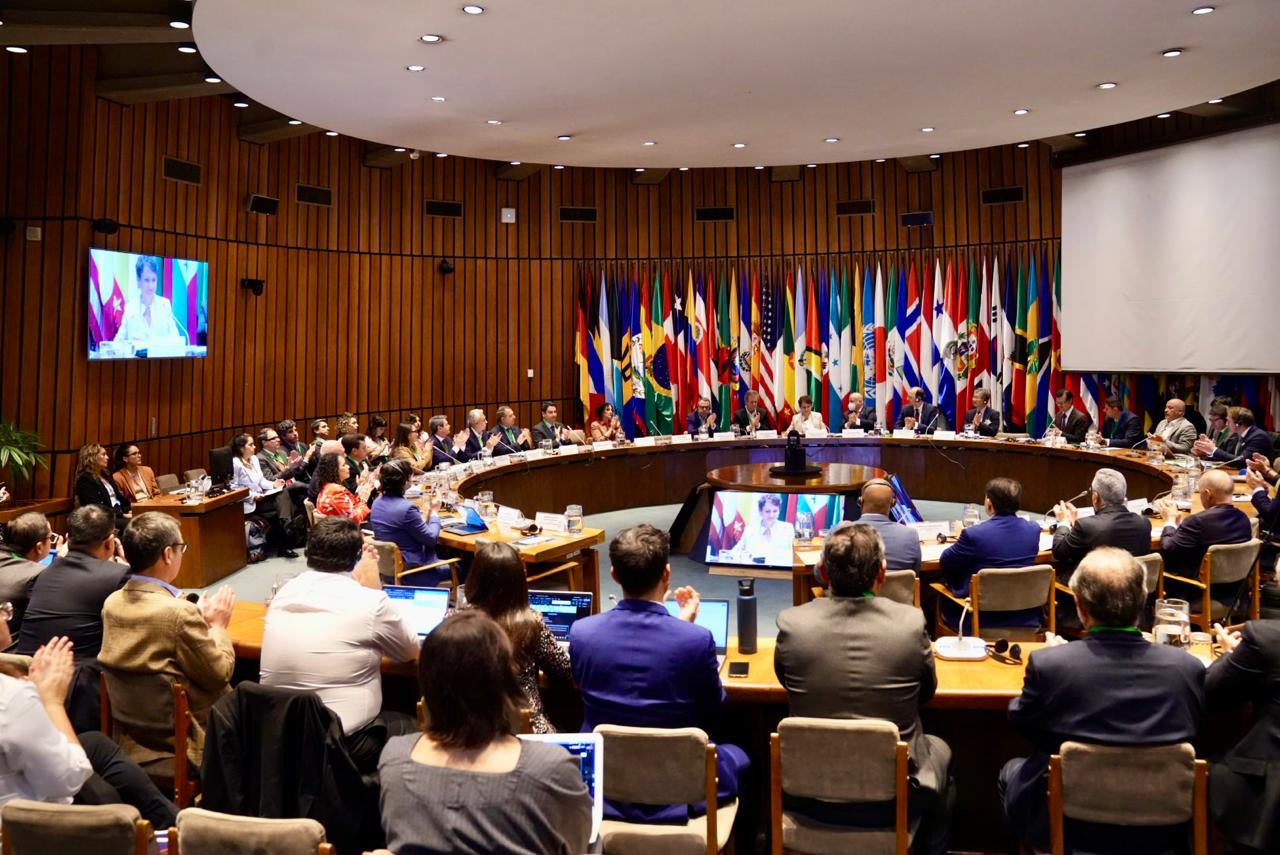Authorities and Experts Stress the Relevance of Improving Transport Infrastructure to Energize Economies and Promote Productive and Sustainable Development
Work area(s)
The Third High-Level Regional Dialogue on Transport in Latin America and the Caribbean was inaugurated at ECLAC’s headquarters in Santiago, Chile.

The Third High-Level Regional Dialogue on Transport in Latin America and the Caribbean was inaugurated this Tuesday, April 2 at the headquarters of the Economic Commission for Latin America and the Caribbean (ECLAC) with the participation of authorities and experts who stressed the importance of improving regional transport infrastructure to energize economies and promote productive and sustainable development.
The two-day event – organized by the International Transport Forum (ITF) and the Ministry of Transport and Telecommunications of Chile, with collaboration from ECLAC – brings together Transport and Telecommunications Ministers and authorities from various countries of the world, international experts and representatives of public and private sectors, to address the challenges posed by the future of public transport, governance, the relationship between infrastructure and climate change, informal transport and accessibility, port and logistics development, road safety and new energy sources, especially after the COVID-19 pandemic.
The opening session featured the participation of Carolina Tohá Morales, Minister of the Interior and Public Security of Chile; Juan Carlos Muñoz Abogabir, Minister of Transport and Telecommunications of Chile; Marius Skuodis, Minister of Transport and Communications of Lithuania, the country that currently holds ITF’s presidency; Javier Medina-Vásquez, ECLAC’s Deputy Executive Secertary; and Young Tae Kim, Secretary-General of ITF.
In her welcome remarks, Chile’s Minister of the Interior and Public Security, Carolina Tohá, emphasized that social changes have transformed transport into one of the critical pillars in terms of how to build the environmental sustainability of economic development and how to build equality.
Meanwhile, the country’s Minister of Transport and Telecommunications, Juan Carlos Muñoz Abogabir, indicated that sustainability in transport is no longer a necessity – it is now a matter of urgency in our cities. “Our region strongly pushes issues of transport and very successful solutions have arisen,” he said.
In his remarks on behalf of ECLAC’s Executive Secretary, José Manuel Salazar-Xirinachs, the United Nations regional organization’s Deputy Executive Secretary, Javier Medina-Vásquez, noted that an efficient infrastructure, transport and logistics system is fundamental for the region’s development.
“The latest edition (2023) of our annual report International Trade Outlook for Latin America and the Caribbean confirms that one of the region’s big challenges lies in the need to improve transport and logistics infrastructure so trade can flow more smoothly and the region’s international competitiveness can be increased,” he stated.
“In a circle that is not virtuous, the low levels of economic growth seen in the region in the last decade have translated into reduced public and private investment levels and, thus, into an infrastructure stock that is insufficient for energizing economies and promoting productive development. Allocating the necessary resources to maintain and repair existing infrastructure, improving technical and regulatory frameworks, and preparing for the challenges of climate change and the extreme phenomena that go along with it are currently a priority for the region,” he added.
“We at ECLAC are aware that increasing the amount of investment and reducing infrastructure gaps to fulfill the Sustainable Development Goals (SDGs) poses a great challenge, especially at this time, when countries have reduced fiscal space and in many cases high levels of debt. However, it is not possible to continue with the status quo. This situation requires exploring innovative financing options at a national, regional and multilateral level, with those linked to green infrastructure development standing out in particular,” Javier Medina underscored.
On the second day of the Third High-Level Regional Dialogue (Wednesday, April 3), ECLAC will release an updated version of its Maritime and Logistics Profile, an interactive online tool that presents information on the region’s port activity, modal split in international transport, and selected data on regional infrastructure endowment and performance.
In keeping with tradition, the Maritime and Logistics Profile of Latin America and the Caribbean will include the most recent Port Report of ECLAC from the first quarter of 2022 to the first quarter of 2023.
Type
Country(ies)
- Latin America and the Caribbean